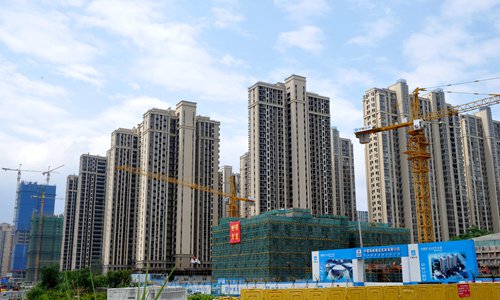
Buildings under construction in Fuzhou, capital of East China's Fujian Province (Photo: VCG)
A slew of recent disappointing data has underlined the daunting challenges facing the Chinese economy and requires a response from policymakers, but it also reflects the short-term effect of China's economic reforms and efforts to fend off risks, analysts said on Wednesday.
Overall, the Chinese economy is moving toward a healthier, more sustainable model as planned by policymakers and the downward pressure is under control, they noted.
Among the recent indications of slowing growth in a wide range of key areas, a private survey released on Wednesday showed that growth of the country's services sector further weakened in August.
The Caixin China General Services Purchasing Managers' Index (PMI) for August came in at 51.5, the lowest level in 10 months, as services companies struggled to attract new business and faced rising costs.
The Caixin China Manufacturing PMI also dropped for a third consecutive month in August, falling to 50.6, the lowest reading since July 2017. Recent data for retail sales and fixed-asset investment also pointed to sluggish growth in these areas, which are two of the main drivers of economic growth.
Coming at a time when China is engaged in an escalating trade war with the US, the disappointing data has led to speculation that the Chinese economy is headed for serious trouble and that policymakers are failing to change course.
Some US officials have reportedly suggested that the recent downturn in China gives the US more leverage in the trade war.
Not so bad
"As always, [US officials] are judging the Chinese economy from afar and they don't have the most basic knowledge of what is going on in China," Cao Heping, professor of economics at Peking University, told the Global Times.
Cao noted that the Chinese economy has already begun to shift toward a new growth model based on domestic consumption and innovation, and away from the earlier model, which relied on investment and exports.
"During such a massive transformation, it is inevitable that some key areas in the 'old economy' will have a tough time. But judging the Chinese economy using those old indicators is just not accurate anymore," he said, adding that the "new economy" spurred by the booming e-commerce sector has become a key driving force.
Tian Yun, vice president of the Beijing Economic Operation Association, explained that China has been making efforts to address problems that have gradually accumulated over the years, including high debt and overcapacity, and this is one of the main reasons for the recent downturn.
"Basically, we are paying for our mistakes in the past," Tian told the Global Times. "The measures to cut leverage and capacity have taken a toll on economic performance. But these are serious problems we have to address, sooner rather than later, so there is no need to debate that part anymore."
Cao also stressed that "we cannot let the downward pressure derail our reform agenda, even if that means we have to take some short-term pain."
While Chinese policymakers are likely to stick to the reform plan aimed at forming a healthier and more sustainable economic model, officials might move to take remedial measures to ease the pressure and improve confidence, experts said.
"Right now, the most important thing is to improve market expectations. If people are not confident, they won't spend money; if companies are not confident, they won't invest," Tian said, adding that tax cuts might be under consideration.


